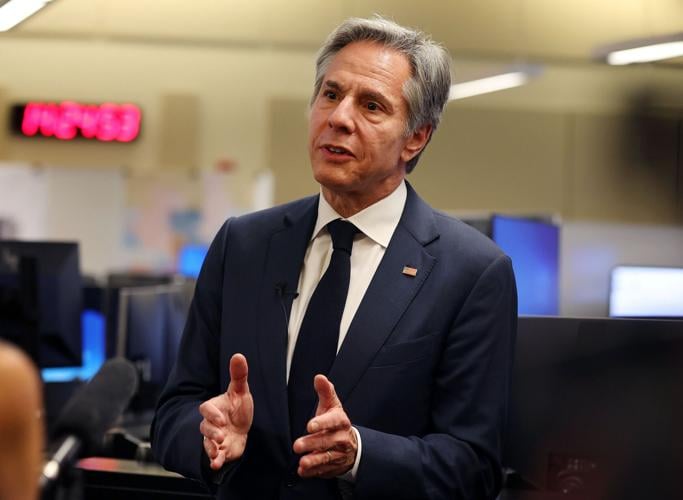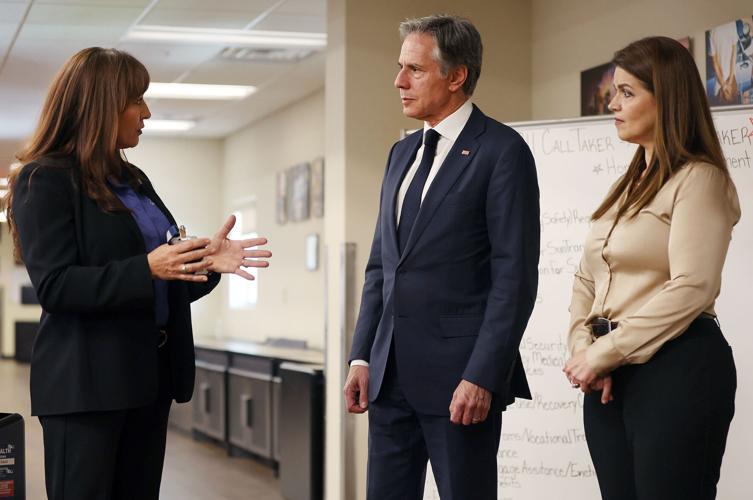U.S. Secretary of State Antony Blinken discussed the devastating consequences drugs like fentanyl are having on communities across the country during a visit Friday to Tucson.
“We see (fentanyl) affecting virtually every American community,” Blinken said during one of his stops here. “Forty percent of Americans know someone who died from opioid overdose. We had about 100,000 or-so overdoses last year. About 75 percent of those related to a synthetic opioid.”
He noted how Tucson’s proximity to the border puts the community on the forefront of trying to cope with the influx.
“As best we can tell, about 95 percent of the fentanyl that’s coming into this country is actually going through these legal ports of entry (at the border), it’s not being smuggled across between them,” Blinken said during a stop at Tucson’s emergency call center, where he was joined by Mayor Regina Romero and officials from Pima County’s health department and the city’s Public Safety Communications Department.
About $35 million in federal funding is on its way to the state to help combat the crisis.
That funding will be going toward a “number of things” that will help to confront the effects of the influx of opioids, Blinken said.
“It’s bringing together all of the different factors, because it can’t just be a law enforcement issue,” he said. “We’ve got to spend the money on (public awareness campaigns), treatment, prevention ... housing.”
Blinken noted the State Department’s Global Coalition to Address Synthetic Drug Threats, which has brought together over 150 countries, and companies within those countries, to “share best practices, share information, and work to get ahead of this.”
In early April, Arizona Katie Hobbs signed the fentanyl sentencing bill HB 2245, the Ashley Dunn Act, a piece of legislation that will “allow for enhanced sentencing for those convicted of selling large quantities of fentanyl.”
“Our state has been flooded with this cheap and deadly drug in recent years, and we need more robust tools to deter those illegally selling large quantities of it in our state,” Arizona Attorney General Kris Mayes commended the bill in a news release. “This legislation is one of those tools allowing for enhanced penalties for those selling over 200 grams of fentanyl, or the equivalent of 2,000 fentanyl pills.”
HB 2245 penalizes first-time offenders who sell or transfer fentanyl by a minimum four-year sentence, escalating all the way up to 20 years.
Along with the emergency call center stop, Blinken tour one of the city’s passport centers.
Romero said that the city council and the Pima County Board of Supervisors will both look to pass resolutions next week to declare the southern Arizona fentanyl situation an emergency.
“It’s because of federal dollars that we have been able to create programs like the Community Safety, Health and Wellness (department), the Housing First program, and Department of Justice funds have helped us create the community service officer positions. In four years we went from zero to 140 community service officers... This is the frontlines of (much of that work Blinken does) throughout the world.”
Additionally, the two bodies will be entering into an intergovernmental agreement (IGA) to figure out how they will be further spending funds from the One Arizona Distribution of Opioid Settlement Fund, Romero said.
Blinken was set to head to Sedona Friday night to speak with U.S. Sen Mitt Romney, to discuss current U.S. foreign policy and the Secretary of State’s recent trips to China and the Middle East.





